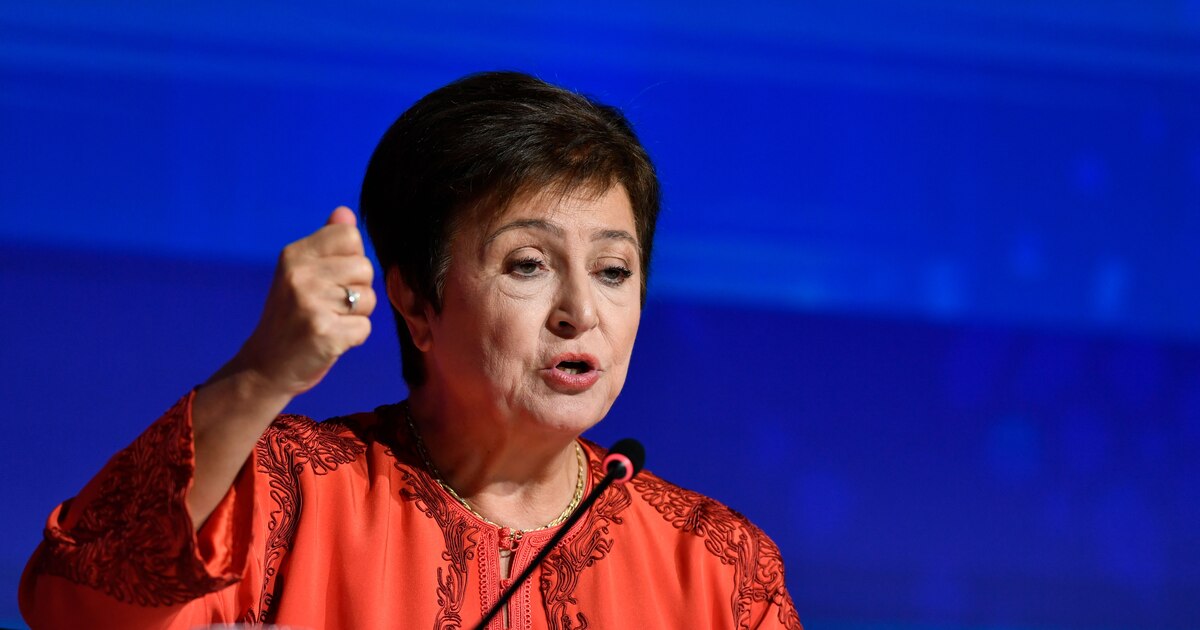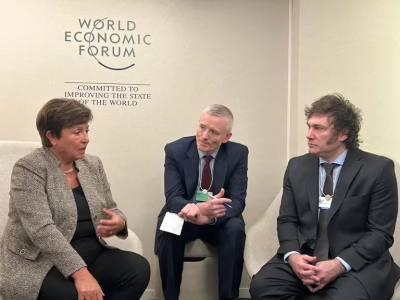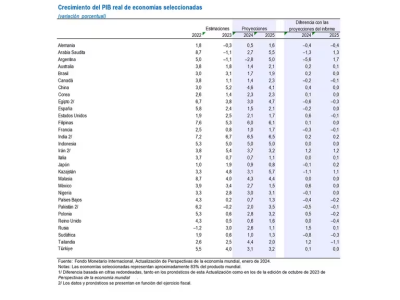Ron
Well-known member
The IMF worsened its projection for Argentina by estimating a recession of 2.8% this year: what it said about high inflation - Infobae

Source:

 www.infobae.com
www.infobae.com
January 30, 2024
In the global economic estimates report published today, the Fund assured that the significant adjustment could stabilize the economy; Its chief economist anticipated how the price rise will continue this year and highlighted the need for fiscal and monetary reforms
By Mariano Boettner and Agustin Maza

Georgieva and Milei in Davos
The International Monetary Fund (IMF) recalculated its estimate for the Argentine economy this year and projected a sharp drop of 2.8% as a result of the “considerable adjustment” that it will experience throughout 2024 due to the measures of Javier Milei 's government . For next year, however, he predicts a sharp rebound of 5 percent . The recession and inflation will be so pronounced this year that only Argentina pushed a downward recalculation for the entire region and emerging countries, the report mentioned.
One day before the meeting of the organization's board of directors, in which the approval of the last technical review completed on January 10 and the authorization of a disbursement of USD 4.7 billion is expected , the IMF made public its update of the Economic Outlook report World Cups (WEO, in English).
The Monetary Fund made some brief references to the situation in Argentina, which is the main debtor to the organization and which in the last month and a half experienced major changes in economic policy after the change of government, which included the release of relative prices, a strong initial devaluation, liquefaction of public spending and debt and measures to contract the monetary base.
The IMF framed its comment on Argentina in an analysis of what it estimates for the entire region: a general slowdown explained, in part, by the Argentine recession . “In Latin America and the Caribbean, growth is projected to decrease from an estimated 2.5% in 2023 to 1.9% in 2024, and to increase to 2.5% in 2025, which corresponds to a downward revision for 2024 of 0.4 percentage points compared to the October 2023 WEO projection. The revision of the forecast for 2024 is due to negative growth in Argentina in the context of a significant adjustment of economic policy to establish macroeconomic stability ", assured the organization headed by Kristalina Georgieva .

Real GDP growth of selected economies IMF
“As in other major economies in the region, there are improvements of 0.2 percentage points for Brazil and 0.6 percentage points for Mexico, mainly due to the knock-on effects of stronger-than-expected domestic demand and higher greater than expected in the main trading partners,” the Fund report added.
In a section in which it analyzes the inflation outlook , the IMF considered that “the forecast has been revised downwards for both 2024 and 2025 in advanced economies, while it has been revised upwards for 2024 in market economies. emerging and developing, due above all to Argentina ,” stated the Monetary Fund.
In that sense, the director of the IMF's research department, Pierre-Olivier Gourinchas , made a projection during the press conference in which the WEO was presented on the decline in inflation that Argentina expects to have from the middle of the year onwards, although he clarified that the consolidation of this process depends on the continuity of the fiscal and monetary adjustment process. The economist stated that for the second semester the CPI could be reduced by up to 150% annually "at the end of this year", which would be consistent with a monthly digit "starting in the middle of the year."
In this regard, Gourinchas maintained that “the current Government is trying to achieve considerable fiscal consolidation to reach a primary surplus of 2 points of GDP this year. That is equivalent to adjusting fiscal accounts by about 5 points of GDP. It is something absolutely necessary in the context of the country because the main cause of the inflationary process is monetary financing. For this financing to be completed, the accounts must be consolidated and stabilized.”
The director of the Fund's research department also highlighted that the country's main challenge will be to advance in this consolidation of public accounts in a "durable" manner. The statement comes after the removal of the fiscal chapter of the omnibus law that La Libertad Avanza announced last week, where higher income was expected due to tax increases and the cut in retirement spending.

Pierre-Olivier Gourinchas
The Monetary Fund, in short, put the Argentine perspective into numbers: it estimated that in 2023 the GDP fell 1.1% , that this year the contraction will accelerate to a 2.8% decline (in the report prior to the one published today the estimate era of growth, also 2.8%) and that as a result of the Government's economic policies, it could expand 5% in 2025. In the thirty countries selected by the WEO, Argentina is the only one that will have a recession this year . The rest - among them several from the region and other emerging countries - would end 2024 with a positive sign in the variation of GDP.
In general terms, the Monetary Fund's WEO projected that the global economy would grow 3.1% in 2024 and 3.2% in 2025, which means that the forecasts for 2024 are 0.2 percentage points higher than the October report. “This is due to stronger-than-expected resilience in the United States and several major emerging market and developing economies, as well as fiscal stimulus in China. In any case, the forecasts for 2024–25 are lower than the historical average of 3.8% (2000–19), given the high monetary policy interest rates to combat inflation, the withdrawal of fiscal support in an environment of strong debt that slows down economic activity and low underlying productivity growth,” the agency considered.
}This Wednesday the IMF will discuss the Argentine case in its board . The Reuters agency reported that, in addition to the discussion of the staff report for the seventh technical review that ended on January 10 and the green light for a new disbursement of USD 4.7 billion , the board could enable a postponement of the last review of the Extended Fund Facility (EFF) program , which is scheduled for September. It would take place in November and open the door for negotiation of an entirely new program.
The Board's decision also comes with time at the limit to prevent the Central Bank from having to disburse its own reserves accumulated since the Government took office to meet the payment of some USD 2.7 billion, a maturity that was partially postponed for the Last day of the month. A second expiration will operate the following day, Thursday, February 1.
Nearly two-thirds of the disbursement that the Government will receive at the end of the month if the board of the International Monetary Fund approves it could disappear from the reserves quickly to meet debt maturities payments with the organization, so the USD The announced 4.7 billion could become, in a short time, just over USD 1.6 billion .

Source:

El FMI empeoró su proyección sobre la Argentina al estimar una recesión del 2,8% este año: qué dijo de la alta inflación
En el informe de estimaciones económicas mundiales publicado hoy, el Fondo aseguró que el ajuste significativo podría estabilizar la economía; su economista jefe anticipó cómo seguirá la suba de precios este año y destacó la necesidad de reformas fiscales y monetarias
January 30, 2024
In the global economic estimates report published today, the Fund assured that the significant adjustment could stabilize the economy; Its chief economist anticipated how the price rise will continue this year and highlighted the need for fiscal and monetary reforms
By Mariano Boettner and Agustin Maza

Georgieva and Milei in Davos
The International Monetary Fund (IMF) recalculated its estimate for the Argentine economy this year and projected a sharp drop of 2.8% as a result of the “considerable adjustment” that it will experience throughout 2024 due to the measures of Javier Milei 's government . For next year, however, he predicts a sharp rebound of 5 percent . The recession and inflation will be so pronounced this year that only Argentina pushed a downward recalculation for the entire region and emerging countries, the report mentioned.
One day before the meeting of the organization's board of directors, in which the approval of the last technical review completed on January 10 and the authorization of a disbursement of USD 4.7 billion is expected , the IMF made public its update of the Economic Outlook report World Cups (WEO, in English).
The Monetary Fund made some brief references to the situation in Argentina, which is the main debtor to the organization and which in the last month and a half experienced major changes in economic policy after the change of government, which included the release of relative prices, a strong initial devaluation, liquefaction of public spending and debt and measures to contract the monetary base.
The recession and inflation will be so pronounced this year that only Argentina pushed a downward recalculation for the entire region and emerging countries, the report mentioned.
The IMF framed its comment on Argentina in an analysis of what it estimates for the entire region: a general slowdown explained, in part, by the Argentine recession . “In Latin America and the Caribbean, growth is projected to decrease from an estimated 2.5% in 2023 to 1.9% in 2024, and to increase to 2.5% in 2025, which corresponds to a downward revision for 2024 of 0.4 percentage points compared to the October 2023 WEO projection. The revision of the forecast for 2024 is due to negative growth in Argentina in the context of a significant adjustment of economic policy to establish macroeconomic stability ", assured the organization headed by Kristalina Georgieva .

Real GDP growth of selected economies IMF
“As in other major economies in the region, there are improvements of 0.2 percentage points for Brazil and 0.6 percentage points for Mexico, mainly due to the knock-on effects of stronger-than-expected domestic demand and higher greater than expected in the main trading partners,” the Fund report added.
In a section in which it analyzes the inflation outlook , the IMF considered that “the forecast has been revised downwards for both 2024 and 2025 in advanced economies, while it has been revised upwards for 2024 in market economies. emerging and developing, due above all to Argentina ,” stated the Monetary Fund.
This year's inflation
Regarding Argentine inflation, the IMF noted that “the realignment of relative prices and the elimination of old price controls, the latest depreciation of the currency and its transfer to prices are expected to raise inflation in the short term ” . In December the price index reached 25.5% (211% annually) and it is expected that in January there will be some sign of deceleration, although still in the area of 20% monthly, partly due to the statistical drag of the last month of 2023 .In that sense, the director of the IMF's research department, Pierre-Olivier Gourinchas , made a projection during the press conference in which the WEO was presented on the decline in inflation that Argentina expects to have from the middle of the year onwards, although he clarified that the consolidation of this process depends on the continuity of the fiscal and monetary adjustment process. The economist stated that for the second semester the CPI could be reduced by up to 150% annually "at the end of this year", which would be consistent with a monthly digit "starting in the middle of the year."
In this regard, Gourinchas maintained that “the current Government is trying to achieve considerable fiscal consolidation to reach a primary surplus of 2 points of GDP this year. That is equivalent to adjusting fiscal accounts by about 5 points of GDP. It is something absolutely necessary in the context of the country because the main cause of the inflationary process is monetary financing. For this financing to be completed, the accounts must be consolidated and stabilized.”
The director of the Fund's research department also highlighted that the country's main challenge will be to advance in this consolidation of public accounts in a "durable" manner. The statement comes after the removal of the fiscal chapter of the omnibus law that La Libertad Avanza announced last week, where higher income was expected due to tax increases and the cut in retirement spending.

Pierre-Olivier Gourinchas
The Monetary Fund, in short, put the Argentine perspective into numbers: it estimated that in 2023 the GDP fell 1.1% , that this year the contraction will accelerate to a 2.8% decline (in the report prior to the one published today the estimate era of growth, also 2.8%) and that as a result of the Government's economic policies, it could expand 5% in 2025. In the thirty countries selected by the WEO, Argentina is the only one that will have a recession this year . The rest - among them several from the region and other emerging countries - would end 2024 with a positive sign in the variation of GDP.
In general terms, the Monetary Fund's WEO projected that the global economy would grow 3.1% in 2024 and 3.2% in 2025, which means that the forecasts for 2024 are 0.2 percentage points higher than the October report. “This is due to stronger-than-expected resilience in the United States and several major emerging market and developing economies, as well as fiscal stimulus in China. In any case, the forecasts for 2024–25 are lower than the historical average of 3.8% (2000–19), given the high monetary policy interest rates to combat inflation, the withdrawal of fiscal support in an environment of strong debt that slows down economic activity and low underlying productivity growth,” the agency considered.
“The realignment of relative prices and the elimination of old price controls, the latest depreciation of the currency and its transfer to prices will increase inflation in the short term,” the IMF stated about Argentina.
}This Wednesday the IMF will discuss the Argentine case in its board . The Reuters agency reported that, in addition to the discussion of the staff report for the seventh technical review that ended on January 10 and the green light for a new disbursement of USD 4.7 billion , the board could enable a postponement of the last review of the Extended Fund Facility (EFF) program , which is scheduled for September. It would take place in November and open the door for negotiation of an entirely new program.
The Board's decision also comes with time at the limit to prevent the Central Bank from having to disburse its own reserves accumulated since the Government took office to meet the payment of some USD 2.7 billion, a maturity that was partially postponed for the Last day of the month. A second expiration will operate the following day, Thursday, February 1.
Nearly two-thirds of the disbursement that the Government will receive at the end of the month if the board of the International Monetary Fund approves it could disappear from the reserves quickly to meet debt maturities payments with the organization, so the USD The announced 4.7 billion could become, in a short time, just over USD 1.6 billion .

